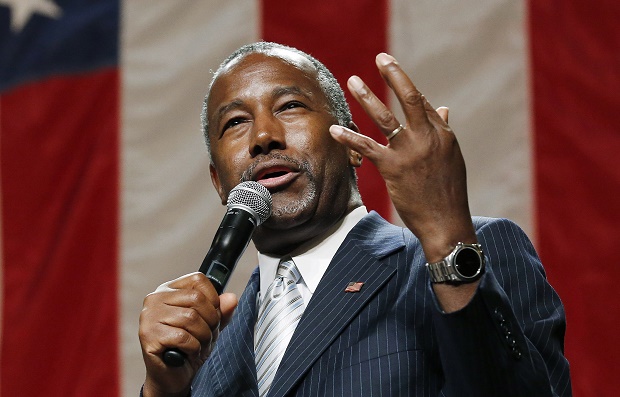Republicans see little political cost in targeting Muslims

In this Aug. 18, 2015 file photo, Republican presidential candidate Ben Carson delivers a speech to supporters in Phoenix. Some leading Republican presidential candidates seem to view Muslims as fair game for increasingly harsh words they might not dare use against any other group for fear of the political cost. So far, that strategy is winning support from conservatives influential in picking the nominee. Carson said allowing Syrian refugees into the US would be akin to exposing a neighborhood to a “rabid dog.” AP FILE PHOTO
Some leading Republican presidential candidates seem to view Muslims as fair game for increasingly harsh words without fear of the political cost. So far, that strategy is winning support from conservatives influential in picking the nominee.
Many Republicans are heartened by strong rhetoric addressing what they view as a threat to national security by Islam itself, analysts say. Because Muslims are a small voting bloc, the candidates see limited fallout.
“It’s highly unlikely to cause a political penalty, and there is no evidence that it has,” said Steve Schmidt, a Republican political consultant who ran Sen. John McCain’s 2008 presidential campaign.
Since the attacks that killed 130 people in Paris, Republican front-runner Donald Trump has said he wants to register all Muslims in the US and monitor American mosques. He has repeated unsubstantiated claims that Muslim-Americans in New Jersey celebrated by the “thousands” when the World Trade Center was destroyed on Sept. 11, 2001.
Rival Ben Carson said allowing Syrian refugees into the US would be akin to exposing a neighborhood to a “rabid dog.” Former Arkansas Gov. Mike Huckabee said, “I’d like for Barack Obama to resign if he’s not going to protect America and instead protect the image of Islam.”
Article continues after this advertisementREAD: Carson joins Trump in claiming US Muslims cheered 9/11 attack
Article continues after this advertisementSuch statements appeal to Republicans who think Obama and Democratic front-runner Hillary Rodham Clinton, the former secretary of state, have not done enough to fight jihadis, said John Green, director of the Bliss Institute of Applied Politics at the University of Akron.
The sentiment also plays well for evangelicals concerned about violence directed at Christians in the Middle East and angered about restrictions their missionaries face in predominantly Muslim countries.
The potency of comments criticizing Muslims was apparent even before recent attacks by extremists in France, Lebanon and Egypt.
Carson’s campaign reported strong fundraising and more than 100,000 new Facebook friends in the 24 hours after he told NBC’s “Meet the Press” in September, “I would not advocate that we put a Muslim in charge of this nation.”
According to a 2014 poll by the Pew Research Center, Republicans view Muslims more negatively than they do any other religious group, and significantly worse than do Democrats. A different Pew poll last year found that 82 percent of Republicans were “very concerned” about the rise of Islamic extremism, compared with 51 percent of Democrats and 60 percent of independents.
Today, 84 percent of Republicans disapprove of taking in Syrian refugees, most of whom are Muslims, compared with 40 percent of Democrats and 58 percent of independents, according to a Gallup poll released just before Thanksgiving.
READ: Clinton urges war on Islamic State, not Muslims
Singling out Muslims is not new. Before the 2012 presidential election, Republican candidate Newt Gingrich called for a federal ban on Islamic law. But candidates at the top of the field stayed away from such rhetoric.
“The kind of things that Donald Trump and Ben Carson are saying today are things that Mitt Romney would have never said,” said Farid Senzai, a political scientist at Santa Clara University. Romney was the Republican nominee in 2012.
Criticism of Muslims is hardly limited to presidential campaigns. In recent years, there have been ads by anti-Muslim groups and well-organized campaigns against the building of mosques, along with pressure on state legislatures to ban Shariah law.
American Muslims make up just under 1 percent of the US population, Pew estimates.
The Muslim Public Affairs Council, a policy and advocacy group based in Los Angeles, sent letters in October to all the presidential candidates asking them to attend the organization’s public policy forum. The candidates either did not respond or declined, council spokeswoman Rabiah Ahmed said.